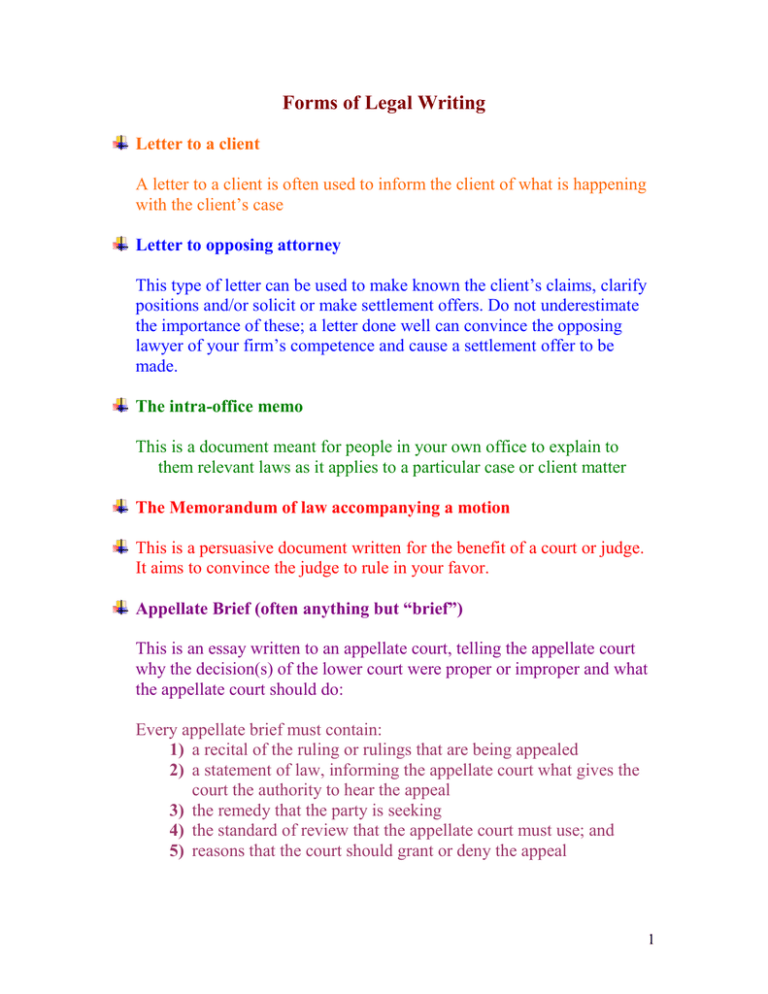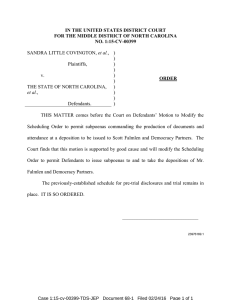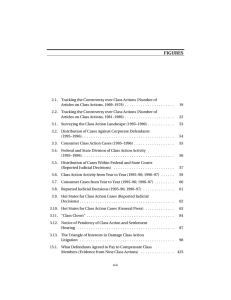Forms of Legal Writing
advertisement

Forms of Legal Writing Letter to a client A letter to a client is often used to inform the client of what is happening with the client’s case Letter to opposing attorney This type of letter can be used to make known the client’s claims, clarify positions and/or solicit or make settlement offers. Do not underestimate the importance of these; a letter done well can convince the opposing lawyer of your firm’s competence and cause a settlement offer to be made. The intra-office memo This is a document meant for people in your own office to explain to them relevant laws as it applies to a particular case or client matter The Memorandum of law accompanying a motion This is a persuasive document written for the benefit of a court or judge. It aims to convince the judge to rule in your favor. Appellate Brief (often anything but “brief”) This is an essay written to an appellate court, telling the appellate court why the decision(s) of the lower court were proper or improper and what the appellate court should do: Every appellate brief must contain: 1) a recital of the ruling or rulings that are being appealed 2) a statement of law, informing the appellate court what gives the court the authority to hear the appeal 3) the remedy that the party is seeking 4) the standard of review that the appellate court must use; and 5) reasons that the court should grant or deny the appeal 1 Basic Concepts in Legal Writing Chief priorities: Be accurate! “Zealous advocacy” does not mean trying to fool a court into believing the law is on your client’s side! Divulge all sources; every statement of law must have a source ascribed to it! Never make a specific assertion of law unless you have a source to back it up i.e.: “The courts have generally looked at this type of claim favorably” or “Courts apply a totality of the circumstances test in this situation.” Both statements need sources or examples or they should not be used! Do not try to “spin” what the source is trying to say! You can interpret or disagree with a source, but make sure the reader understands that this is your take. i.e.: DON’T: “The court meant to confine its analysis to the specific facts presented” DO: “It is the author’s position that it would be illogical to extend the court’s reasoning beyond the facts of that particular case.” Be understandable! A lay person should be able to understand your writing; avoid “legalese” except where absolutely necessary! Be concise! Readers appreciate it when you save them time; be as concise as possible while fully making your arguments. Be persuasive! Your job is to convince, not to tell stories. Everything you say should be geared toward your conclusion (applies only to persuasive memoranda, such as appellate briefs). Always give reasons for everything you say. Remember the magic word: BECAUSE 2 Clarity in Writing – Principles Clarity keeps the reader’s attention and simplicity will make people pay closer attention to what you are saying! Speaking in verbose terms or legalese may convince people that you have a fancy education, but it will not convince them of what you are trying to say! If people have to spend less time deciphering what you say and reading your points, they will appreciate you more and will work harder to appreciate your points instead of to understand them! Write forcefully! Don’t fudge or hedge your bet in making your points. Every point you make should be completed by a conclusion that clearly states what it is you showed in the preceding portion of your paper. Use a new paragraph for every new idea. Don’t be afraid to use one or two sentence paragraphs. Do not try to make two distinct points in one paragraph. Use clear and understandable transitional words or phrases to allow your writing to flow; examples: accordingly nevertheless moreover because consequently on the contrary additionally on the other hand hence in contrast similarly finally 3 Clarity in Writing - Things to Avoid “Throat clearing” phrases “It would appear to be the case that…” “It is our position that this is a matter of significance.” Needlessly long sentences or phrases “The parties were in agreement with respect to the terms of the rent agreement regarding the amount of rent owed by the tenant to the landlord and with respect to the time intervals during which the rent would be paid” Can be replaced with “The parties agreed on the amount of rent due and the due date.” Avoid verbose word clusters Verbose the fact that he died he was aware of the fact that In spite of the fact that because of the fact that is required in the situation in which In the majority of instances until such time as for a period of five years Concise his death he knew Although Because is needed when usually until For five years 4 Clarity in Writing - Organization Any persuasive writing sample must have the following elements: 1) Issue: Tell the reader what it is you are setting out to accomplish with this essay 2) Rule: State what the relevant rule of law is 3) Analysis: Interweave the state law with the facts of the case 4) Conclusion: Explain, based on the application of the law to the facts of the case, what the result in the case must be [Some writers prefer to open with the conclusion as well, to show the reader where the memo is going from the outset. This is a matter or individual preference and you can choose whether to do so.] Where applicable, persuasive essays relating to cases should also have the following: o A brief summary of the facts of the case o The procedural history of the case (how it came to be in the court where it currently sits) o at the end, a conclusion, stating what is being asked for from the court. 5 Gottreich The Gottreichs do state the alleged misrepresentations with particularity - [**2] the defendants' claims of expertise and special knowledge, as bases for predictions that the price of shares in Educational Development, Inc., and other companies would rise, thus providing capital gains. The Gottreichs further allege that the defendants knew, or [*867] should have known, n1 that the representations were false. That conclusion may also be inferred from the prior allegation that the stock recommendations "were made wilfully and recklessly, without an adequate or reasonable basis, and without sufficient and proper investigation and analysis . . ." Defendants say that an allegation that they knew that the representations were false is not the equivalent of an allegation that the representations were false. How could defendants know that they were false if they were not false? We had thought that this kind of nit-picking had disappeared in 1938, when the Federal Rules of Civil Procedure were first adopted. - - - - - - - - - - - - - - Footnotes - - - - - - - - - - - - - - n1 In view of the holding in Ernst & Ernst v. Hochfelder, 1976, 425 U.S. 185, 96 S. Ct. 1375, 47 L. Ed. 2d 668, that Section 10(b) and Rule 10(b)-5 do not encompass negligent misrepresentation, the portion of the complaint stating "or should have known" will be disregarded for the purpose of assessing the sufficiency of the pleadings, at least with respect to the federal claim for relief. - - - - - - - - - - - - End Footnotes- - - - - - - - - - - - - [**3] The defendants stand charged with making what purported to be an expert prediction, based upon special knowledge, when in fact, they had no basis for claiming such expertise or knowledge. Such predictions may constitute misstatements of material facts, and brokers may be subject to liability for making them. Marx v. Computer Sciences Corp., 9 Cir., 1974, 507 F.2d 485, 489; G & M, Inc. v. Newbern, 9 Cir., 1973, 488 F.2d 742, 745-46. Moreover, the amended complaint does indicate "the time, place and content of the false misrepresentations, the facts misrepresented and what was obtained or given up as a consequence of the fraud." 2A J. Moore, Federal Practice para. 9.03, at 1927-1928 (2d ed. 1975). Defendants argue that the complaint does not adequately plead causation or damages because the Gottreichs' loss can be explained by a general decline in stock prices rather than by the Gottreichs' reliance on any representations made by the defendants. n2 This argument is meritless. The Gottreichs do not charge that the defendants' misrepresentations caused the market price of the securities to go down. They charge that the defendants' misrepresentations [**4] caused them to make and hold investments in a declining market. They relied on the misrepresentations; thus causation is adequately alleged. The damage allegation gives the defendants more than sufficient notice of the Gottreichs' legal theory and the ultimate facts on which they rely. - - - - - - - - - - - - - - Footnotes - - - - - - - - - - - - - - n2 Defendants say in their brief: The duty owing from defendants to plaintiffs in the abstract will vary, under White, relative to the juxtaposition of the real world environmental encasement of the two sides. The concept of causation would seem less plastic. Briefs should be written in the English language! - - - - - - - - - - - - End Footnotes- - - - - - - - - - - - - Reversed and remanded for further proceedings. n3 6

